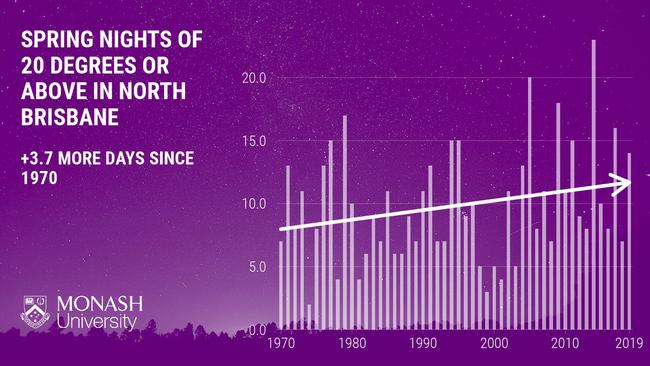Northern suburbs including Gordon Park can expect more clouds and scattered thunderstorms this Halloween weekend
Dr Christa Pudmenzky discusses this weekend's forecast plus how nighttime temperatures are getting warmer across Brisbane.

HyperLocal
Don't miss out on the headlines from HyperLocal. Followed categories will be added to My News.
After severe weather warnings for much of the coast, North Brisbane is in for a sunny Friday, followed by scattered thunderstorms over the weekend with temperatures in the high 20s.
Daytime temperatures aren't the only thing getting warmer during spring.
Residents are also in for a warmer night's sleep, with around three more nights of the season reaching at least 20 degrees when compared to the 1970s.
Warmer nighttime temperatures are increasing across the board, particularly along the coast, where Cape Moreton also recorded 15 more spring nights of 20 degrees or above.
Voices from your community
Susan Gribble cares for sick, injured or orphaned koalas with Koala Rescue Qld.
She has noticed how the changing weather patterns have affected the springtime breeding cycle of koalas, considered a 'vulnerable' species in southeast Queensland.
"(Years) back, koalas had a distinct breeding cycle around September to November, coinciding with spring arriving," Ms Gribble said.
However, in recent years Ms Gribble has noticed that koalas are breeding earlier, and puts this down to warming seasons.
"The winters are a lot warmer, and koalas are breeding throughout autumn and winter.
"Joeys are emerging from pouches out of season, which isn't ideal as the cool nights are still a bit much for the little ones... they haven't always furred completely."
Voices like Susan's tell us how the community in north Brisbane feel about their local climate. If you would like to contribute your voice to our column, you can fill out our 5-minute survey here.
Fast fact
Research from Harvard University found that warmer nighttime temperatures can reduce the amount of sleep people get.
In a study of 765,000 people, they found that when nighttime temperatures were hotter than average, people reported more nights of insufficient sleep.
Dr Christa Pudmenzky is a climate scientist at the University of Southern Queensland.
This column is part of a collaboration between Monash University and News Corp to deliver hyperlocal weather and climate information.
Questions? You can email us at mcccrh@monash.edu
